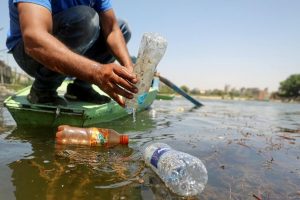
Según un estudio de 2019 del Fondo Mundial para la Naturaleza (WWF), Egipto es responsable de más del 40% de los residuos plásticos vertidos en el Mediterráneo.
Una investigación realizada en 2020 reveló datos muy negativos. Se diseccionó y examinó el tracto gastrointestinal de una muestra de dos peces diferentes que habitan en el Nilo y que fueron comprados a vendedores de El Cairo y se halló más del 75% de ellos contenían microplásticos, uno de los niveles más elevados del mundo.
Los pescadores de la zona afirman que son cada vez más plásticos y menos peces lo que pescan en esas aguas. Para combatir este riesgo, un grupo de egipcios ha empezado a organizar encuentros semanales en El Cairo para limpiar las aguas del Nilo. Sin embargo, en vista de la dificultad de la situación, decidieron, en 2018, impulsar la iniciativa Very Nile, comprando el plástico que las comunidades de pescadores de las islas de la capital recojan directamente del río. Además, con el objetivo de ofrecer más oportunidades a los habitantes de la zona, una parte del plástico que se pesca en el Nilo se utiliza, una vez procesado, en un taller que da empleo a tiempo completo a más de 20 personas, gran parte de ellas, mujeres.
Arafa Saber, pescador, comenta “antes de la iniciativa, el Nilo era un escenario sucio, ahora hay una gran diferencia, no del 100%, sino del 1000%: hay más peces, el Nilo está más limpio, el olor, todo”.
__
According to a 2019 study by the World Wide Fund for Nature (WWF), Egypt is responsible for more than 40% of the plastic waste dumped in the Mediterranean.
Research conducted in 2020 revealed very negative data. It dissected and examined the gastrointestinal tract of a sample of two different Nile-dwelling fish bought from vendors in Cairo and found more than 75% of them contained microplastics, one of the highest levels in the world.
Fishermen in the area say they are catching more and more plastic and fewer and fewer fish in these waters. To combat this risk, a group of Egyptians have started organising weekly meetings in Cairo to clean up the waters of the Nile. However, in view of the difficulty of the situation, they decided in 2018 to launch the Very Nile initiative, buying the plastic that the fishing communities of the capital’s islands collect directly from the river. In addition, with the aim of offering more opportunities to the inhabitants of the area, part of the plastic caught in the Nile is used, once processed, in a workshop that provides full-time employment for more than 20 people, most of whom are women.
Arafa Saber, a fisherman, says “before the initiative, the Nile was a dirty place, now there is a big difference, not 100%, but 1000%: there are more fish, the Nile is cleaner, the smell, everything”.
__

